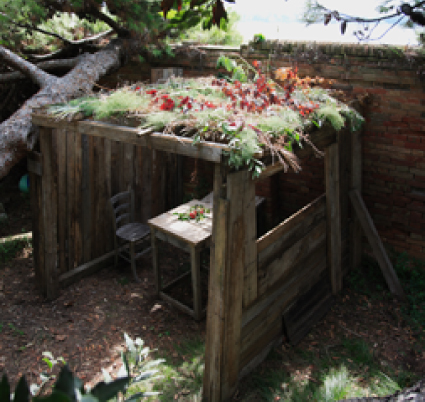Sukkah di San Servolo,
Installation in situ, Venise 2007.
Lors de sa résidence sur l’île de San Servolo à Venise Philippe Terrier-Hermann a décidé d’y exposer la liste complète des noms des 8000 juifs déportés d’Italie durant la seconde guerre mondiale, et de marquer en rouge les noms qui portaient les mêmes initiales que les 6 patients de l’hôpital psychiatrique de San Servolo, arrêtés par la police Nazie en 1944, 3 jours après la fin de Sukkot (1). En fait, pour des raisons juridiques nous ne connaissons que les initiales de ces six patients. Ce projet a donc la volonté de redonner leur nom et donc une dignité à ces patients déportés. Aussi dans un partie du jardin de l’île, l’artiste a construit illégalement une sukkah, un monument éphémère érigé pour la mémoire d’une diversité persécutée.
1. Sukkot est une fête biblique, qui se tient en automne le quinzième jour de Tishri (normalement en octobre). Le mot Sukkot est le pluriel du mot hébreu Sukkah, qui signifie cabane temporaire. Pendant cette fête, les juifs construisent ces Sukkah dans lesquelles ils prennent leur repas, reçoivent des amis et se reposent. Ces cabanes sont érigées en mémoire de celles que les juifs ont dû construire pour s’y abriter pendant 40 ans dans le désert lors de l’épisode de la fuite en Egypte. Leur structure symbolise la bonté de dieu qui leur a apporté tout ce dont ils avaient besoin pendant leur exode.
During a residency in San Servolo Island in Venice PhilippeTerrier-Hermann decided to expose a complete list of the more than 8000 jews deported from Italy during the Second World War, marking in red the names which bear the same initials as the six patients of the psychiatric hospital of San Servolo arrested by the Nazi police in 1944, three days after the end of Sukkot (1). In fact, for reasons of privacy, we know only the initials of these six patients. Thus, Philippe attempts to give them back a probable name and historic dignity. On a remote part of the island, the artist illegally built a sukkah, an ephemeral monument produced not so much out of any religious conviction, but rather as a testimony to the persecutionof a culture.
1. Sukkot is a Biblical holiday, held in autumn on the fifteenth day of the month of Tishri (usually in October). The word Sukkot is the plural of the Hebrew word Sukkah, which means
temporary shelter. During the festival Jews construct temporary shelters within which they eat their meals, receive guests, relax and also sleep. These shelters are erected in memory of the ones which the Israelites were obliged to build and in which they slept during the 40 years of life in the desert following their Exodus from Egypt. The structures symbolize God’s benevolence which provided for all of their needs during their stay in the desert.
